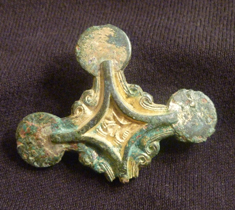Can you dig it? Discover Anglo-Saxon England at Lyminge this summer!
Release Date 18 July 2013

This summer the Kent community has a wonderful opportunity to discover how their county's past helped to shape the England we see today, by experiencing a major archaeological excavation at Lyminge.
Led by the University of Reading, the second year of the Lyminge Archaeological Project begins on Monday 22 July. The dig is set continue to transform our understanding of one of the most important events in our cultural history, the birth of Christianity in Anglo-Saxon England.
This year the public can get ‘hands-on' by volunteering to assist in the excavation. Visitors to the site can also attend a series of free public events, including a permanent exhibition and a fun-filled family-friendly open day on Saturday 17 August.
The University of Reading's Department of Archaeology, with support from project partners Kent Archaeological Society and staff from the Canterbury Archaeological Trust, began excavating the village green of Lyminge in 2012. The archaeologists aim to uncover how pagan Anglo-Saxon society was Christianised with specific reference to Kent, the crucible of the English church. The first year did not disappoint.
Researchers revealed a spectacular and rare Anglo-Saxon feasting hall that provides an exceedingly rare glimpse of royal accommodation of a type otherwise evoked in the Anglo-Saxon poem Beowulf. Artefacts recovered from the foundations of the hall provide definitive evidence for high-status activities, most notable being fragments of luxury glass vessels and a rare bridle fitting of a type that has only previously been found in graves belonging to the Anglo-Saxon warrior elite.
Dr Gabor Thomas, project leader and who has been excavating sites in Lyminge since 2008, said: "Last year was a wonderful start to the excavation. The discovery of the hall, the first of its kind in over 30 years and one of only a handful of such major buildings to be excavated in its entirety, was hugely exciting. The second year promises to be as special and I am delighted we are able to offer the public the chance to join in the excavation One of the joys of archaeology is you never know what you may find but expect more exhilarating discoveries!
"Budding Indian Joneses can join induction mornings for new volunteers which will take place every Wednesday from 9am and every Saturday at 9.30am in the Tayne Centre, Church Road, Lyminge, for the first four weeks of the excavation. Every Saturday throughout the dig (except 17th August) Dr Thomas will give tours of the site and the Coach and Horses Public House in Lyminge will host a fascinating exhibition to accompany the excavations."
The Open Day on Saturday August 17th promises to be a great day out for families with lots of fun activities for children and Saxon re-enactment displays to give a taste of what life was like in the Anglo-Saxon age. Tours of the excavation will be given throughout the day together with opportunities to get up close to some of the rare artefacts freshly uncovered by the archaeologists .
"Whether just visiting the site or joining one of our public events, the excavation makes a fascinating trip," added Dr Thomas. "I look forward to welcoming as many people as possible to Lyminge this summer."
For more information on the project and daily posts on the progress of this summer's excavation please see our website and blog:
http://www.lymingearchaeology.org/
http://blogs.reading.ac.uk/lyminge/
ENDS
For more information, please contact James Barr, press officer, on 0118 378 7115 or email j.w.barr@reading.ac.uk
Notes to Editors:
The Department of Archaeology has an international reputation in research and teaching. The University was awarded the Queen's Anniversary Prize 2009 in recognition of the excellence of the archaeology department, which, uniquely within the study of archaeology, combines ground-breaking research, enterprise and teaching.